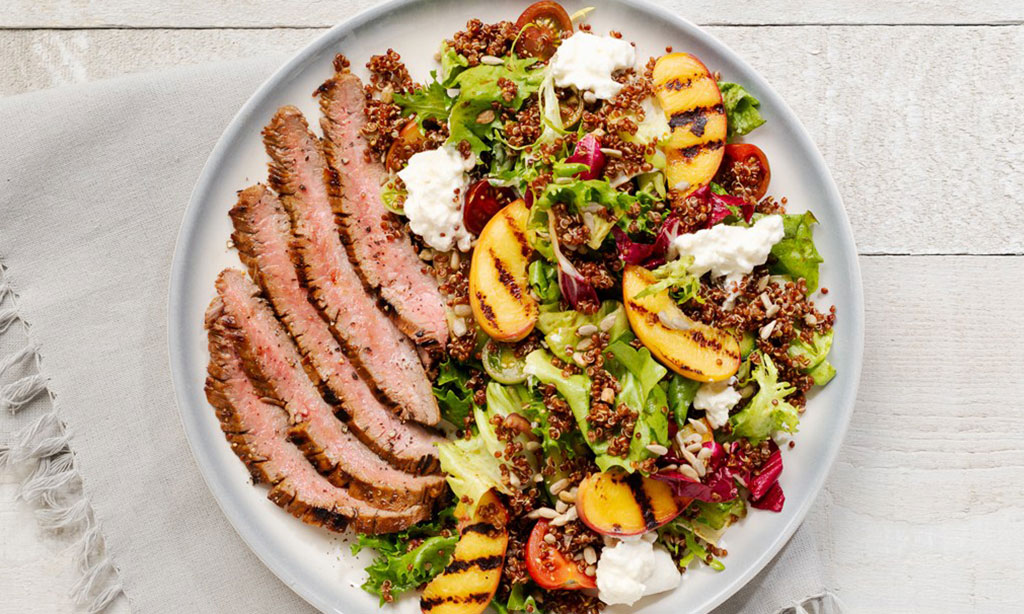Meat and Mental Health

As the pandemic raises awareness about mental health, many Canadians are asking how diet can help. Scientists have long pondered the connection between food and mood. New to the discussion is a ‘study of studies’ from a global report that reviewed 18 studies showing meat eaters have lower risks for depression and anxiety than non-meat eaters.
Here’s why this study caught my eye. Some key strengths of this report include:
- large numbers (160,000 male and female participants);
- wide age range (youth to elderly);
- representation from different populations (Europe, Asia, North America, Oceania)
Most of the studies in this review showed that people who avoided eating meat had significantly higher rates or risk of depression, anxiety and/or self-harm behaviours. For example, one study found that non-meat eaters had rates of depression that were 15% higher and rates of anxiety that were 50% higher than in meat eaters. Another study found that 28% of non-meat eaters had symptoms of depression, compared to 16% of meat eaters.
Good to know: This review did not examine cause and effect. We can’t say that a meat-free diet causes poor mental health. Likewise, eating meat will not guarantee good mental health. For personalized advice about your diet and mental health, consult a registered dietitian.
While the research did not explore why they found that meat eaters tended to have better psychological well-being than non-meat eaters, we do know that 90% of Canadians eat meat and it may provide a sense of familiarity or comfort, especially during these stressful times.
A serving of meat the size of the palm of your hand provides a rich source of high-quality protein which helps us to feel full from one meal to the next. That, in turn, may help us stick with regular mealtime routines which are also important for mental well-being.
Finally, some of the nutrients found in meat may contribute to better mental health outcomes. For example, beef is a popular meat choice that contains choline and is one of the best sources of vitamin B12, both of which are important for good brain health.
DIETITIAN’S KEY TAKEAWAY:
Whether or not you eat meat, optimize your mental well-being through good nutrition; aim to improve your overall diet rather than zeroing in on one nutrient or food. Here’s how:
- Cook with wholesome basics. On average, Canadian diets are too high in ultra-processed foods such as baked goods, hot dogs, pop and chips. Replace them with naturally nutrient-rich foods that support optimal mental wellbeing such as vegetables, fruit, fish and seafood, beef, pulses, eggs, nuts/seeds, hummus, and whole grains.
- Aim to make half your plate veggies and fruit, one-quarter quality protein foods (fish, beef, beans, eggs, tofu, seeds, cheese, poultry, and lentils) and one-quarter whole grains (barley, oats, brown rice).
- Choose a variety of proteins. Protein choices are not created equal. They each come with a unique package of nutrients that benefit health. Challenge yourself to include a couple of protein options in each meal for variety, but also for the benefits gained by eating foods in combinations (food synergy bonus):
- Add lentils and pumpkin seeds to your next salad
- Enjoy garlicky refried beans with your eggs
- Add some ground beef to a bean burger to increase iron absorption by 150%.
Try this sweet-savoury steak and summer peach quinoa salad recipe, courtesy of thinkbeef.ca
YOU MAY ALSO BE INTERESTED IN:
Quick and Easy Meal Ideas, Dietitians of Canada
Healthy Habits to Cope with Stress, Dietitians of Canada
Caring for your Mental Health during COVID-19, Mood Disorders Society of Canada
We can email you tips and tools to help you manage your mental health during COVID-19, Centre for Addiction and Mental Health (CAMH)
COVID-19 Care (videos), National Eating Disorder Information Centre

